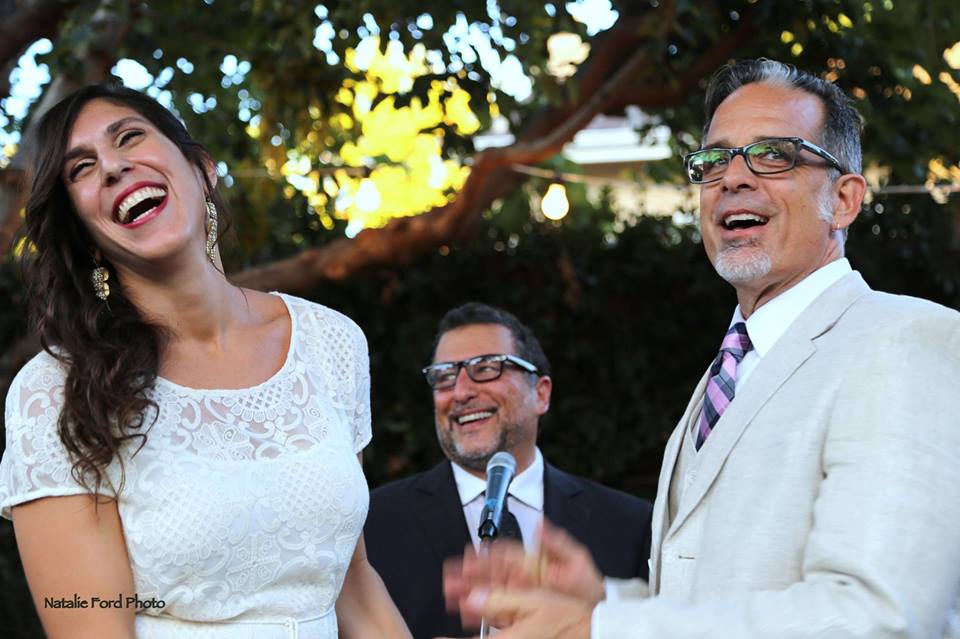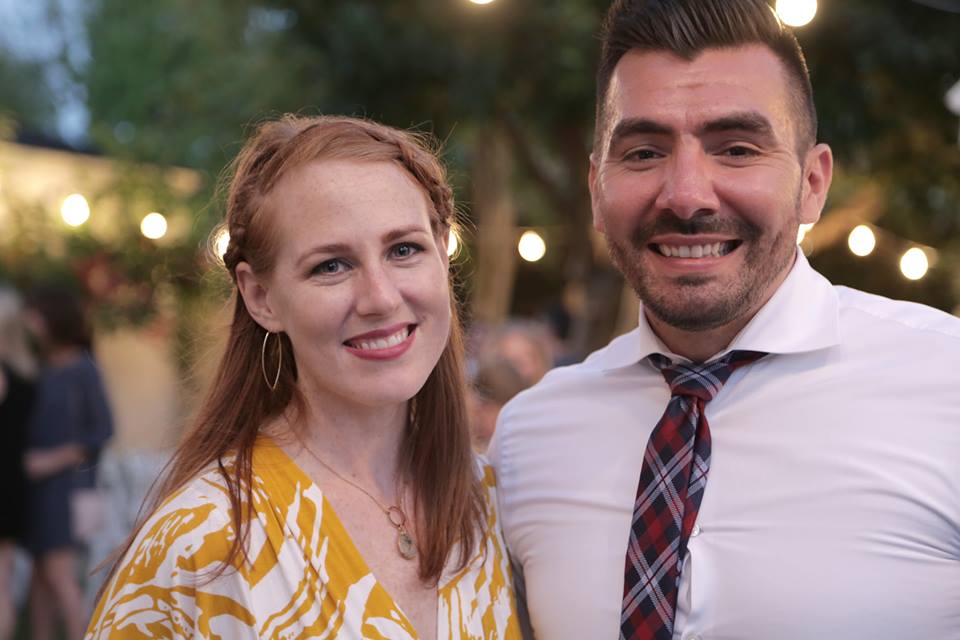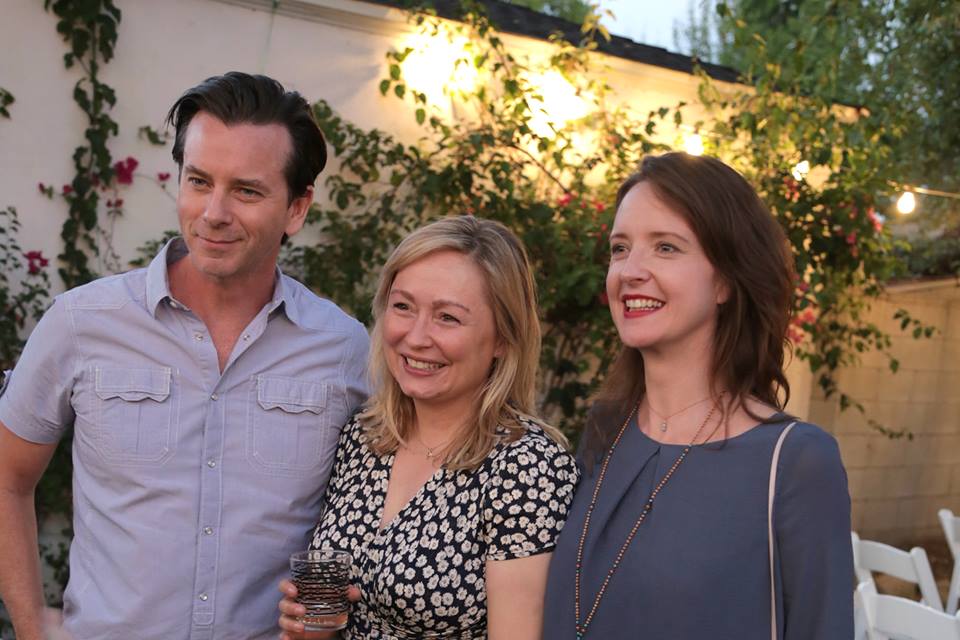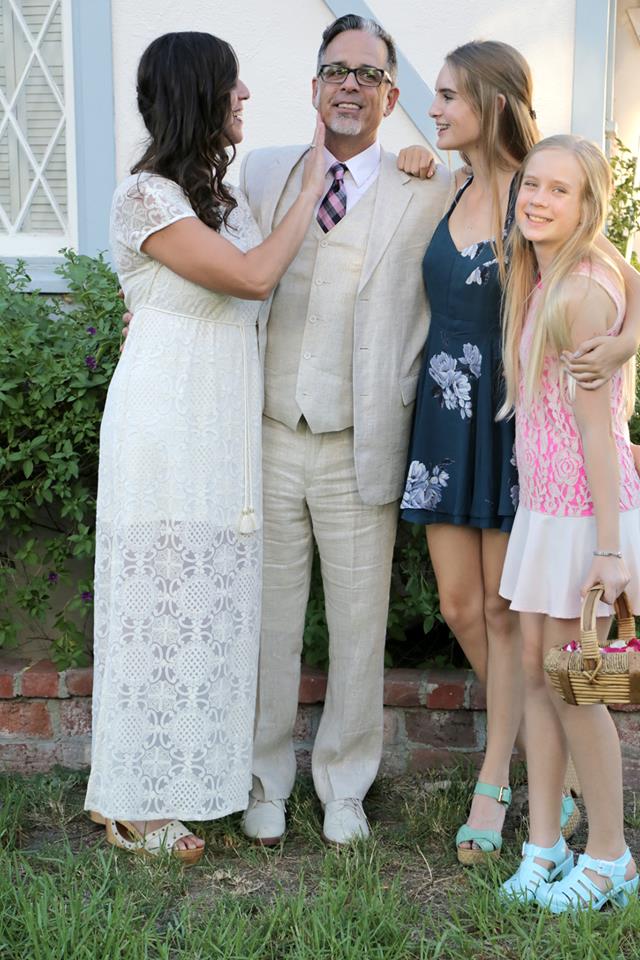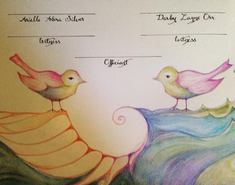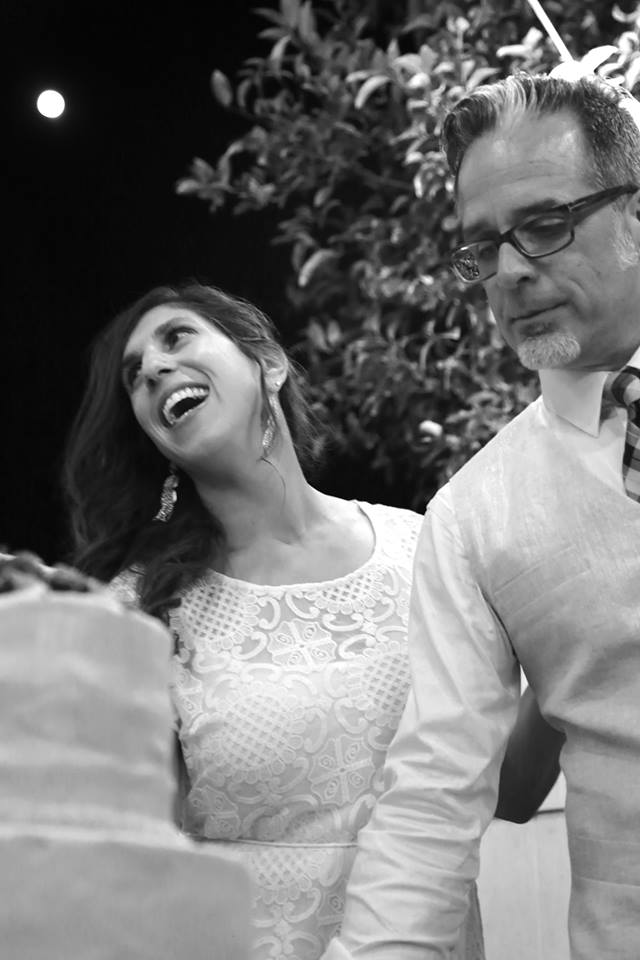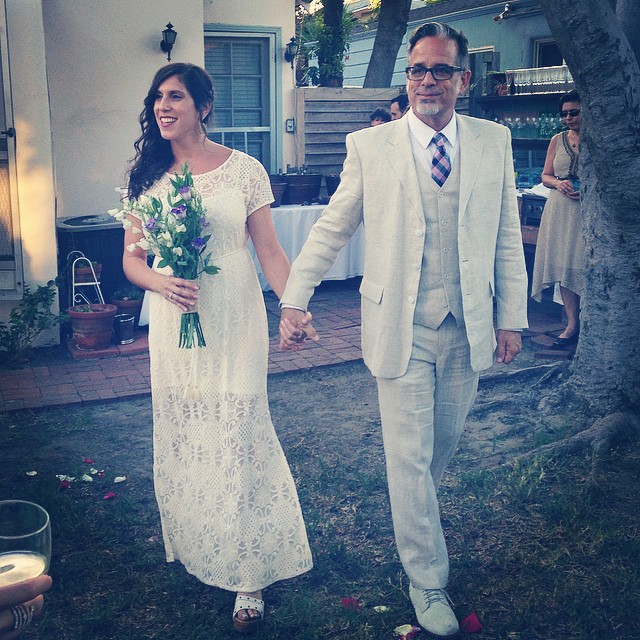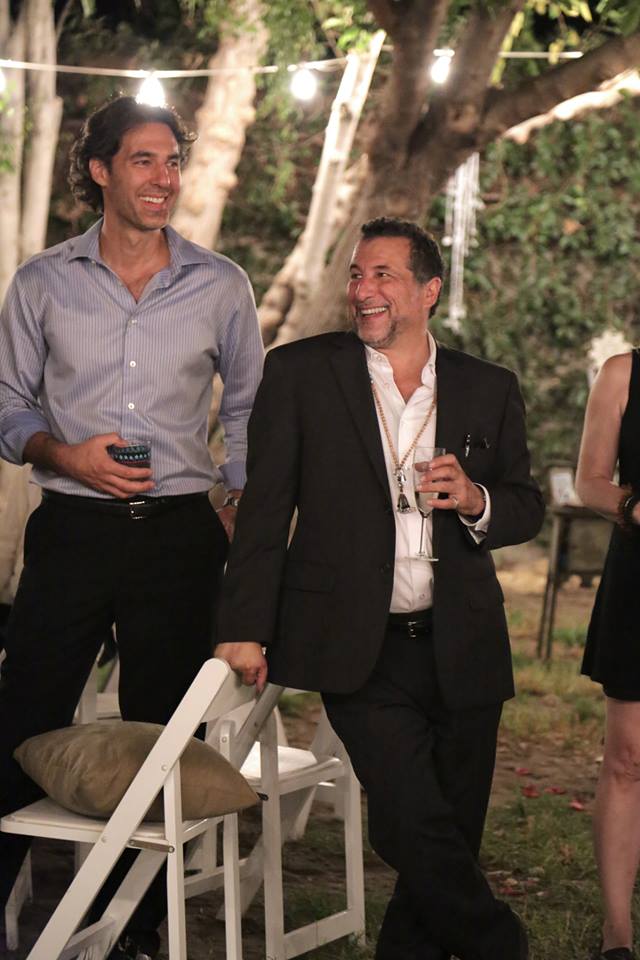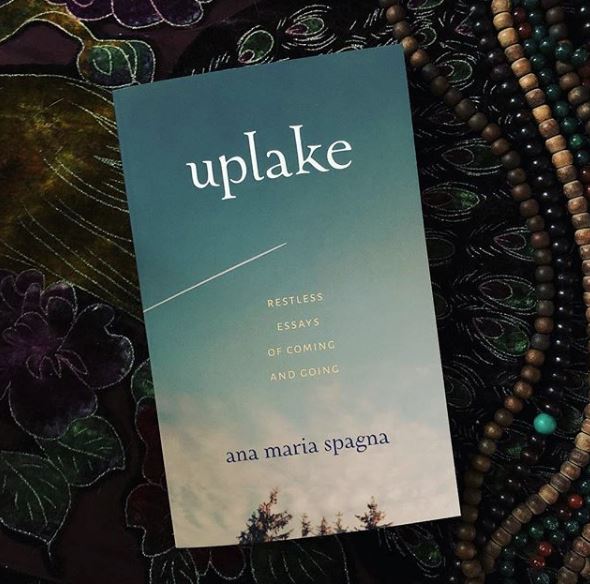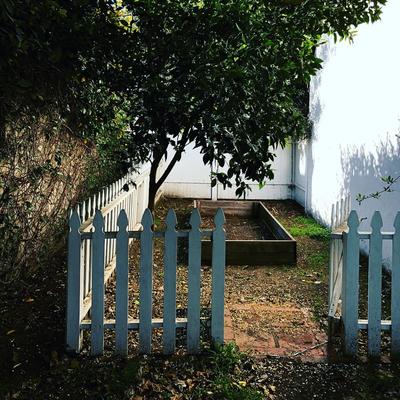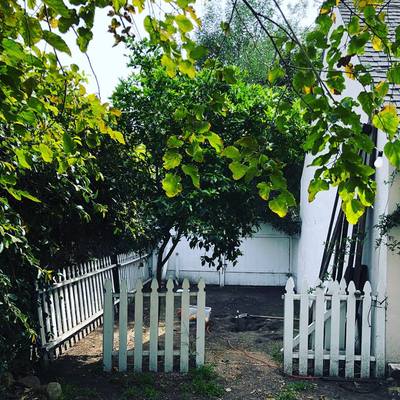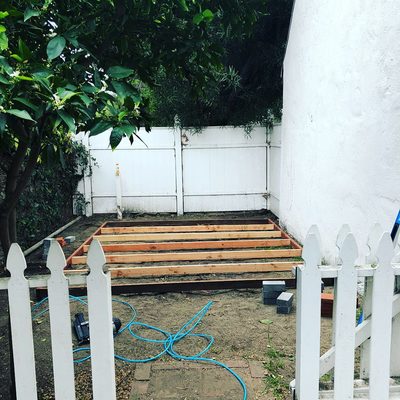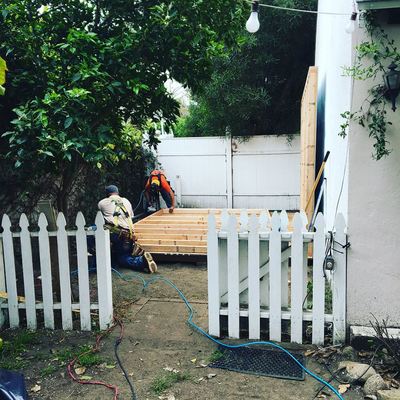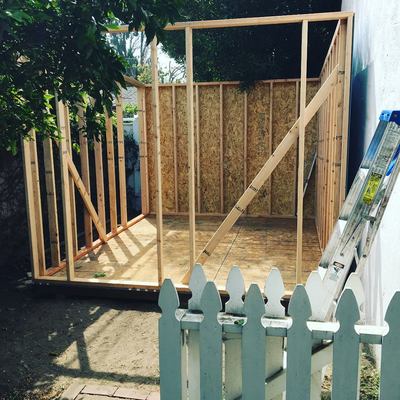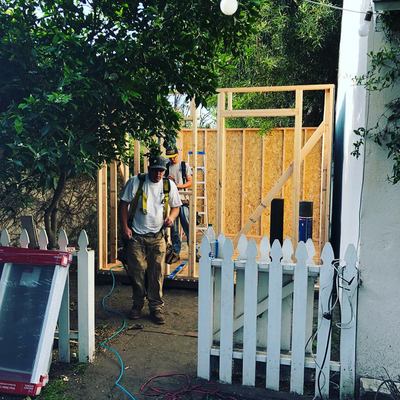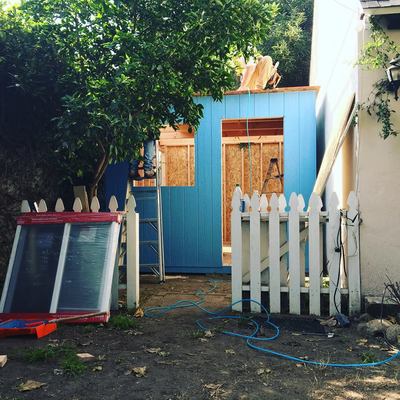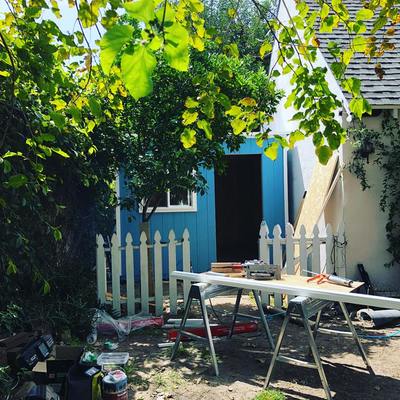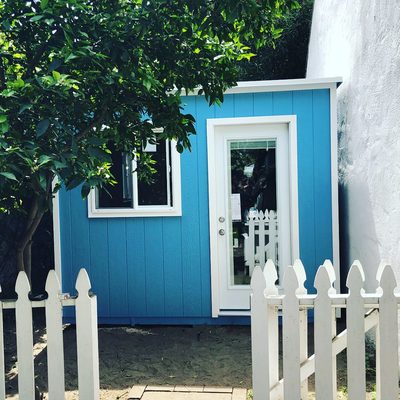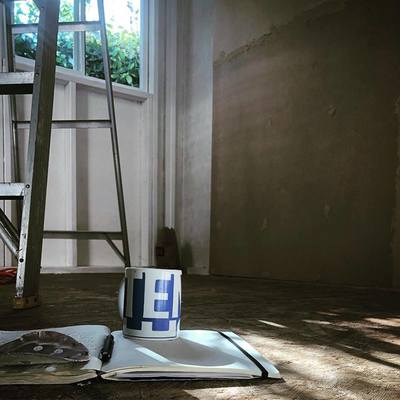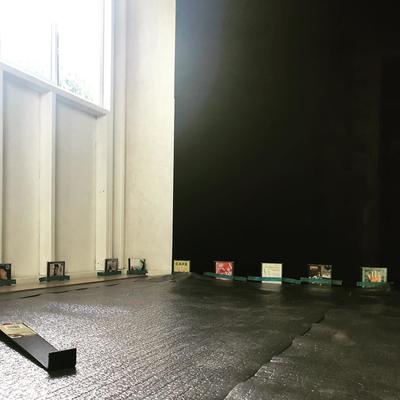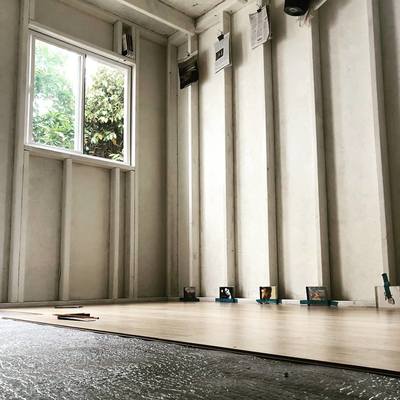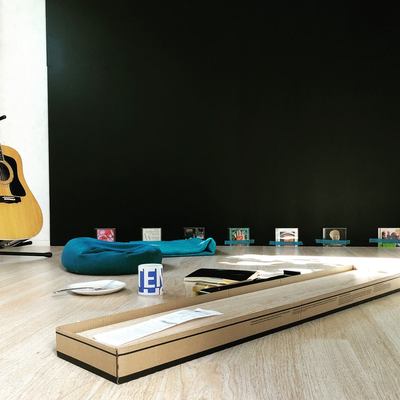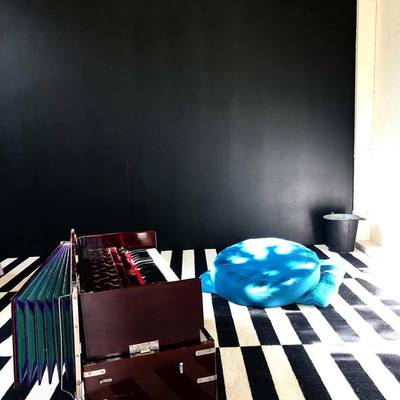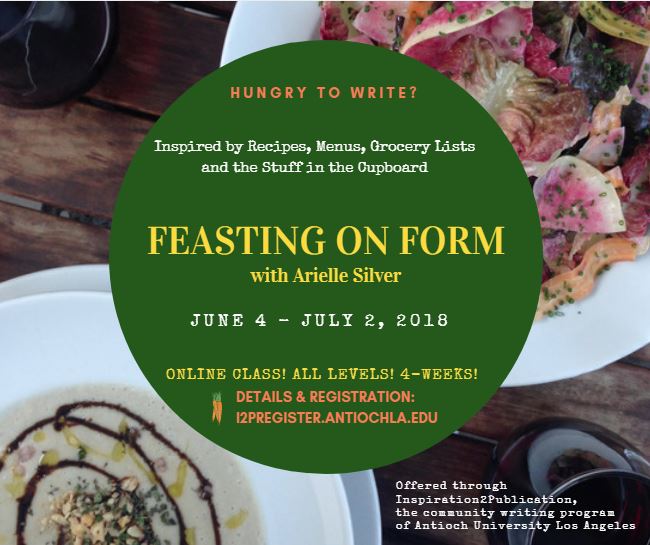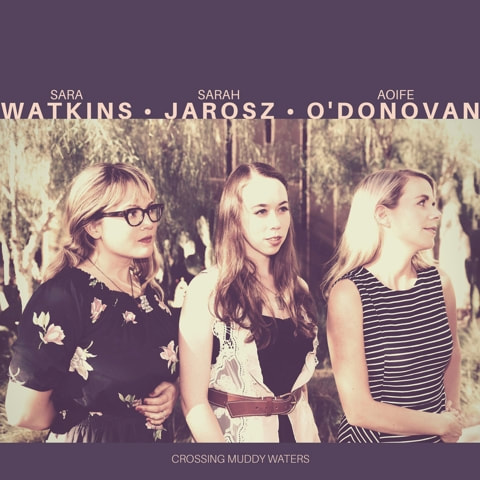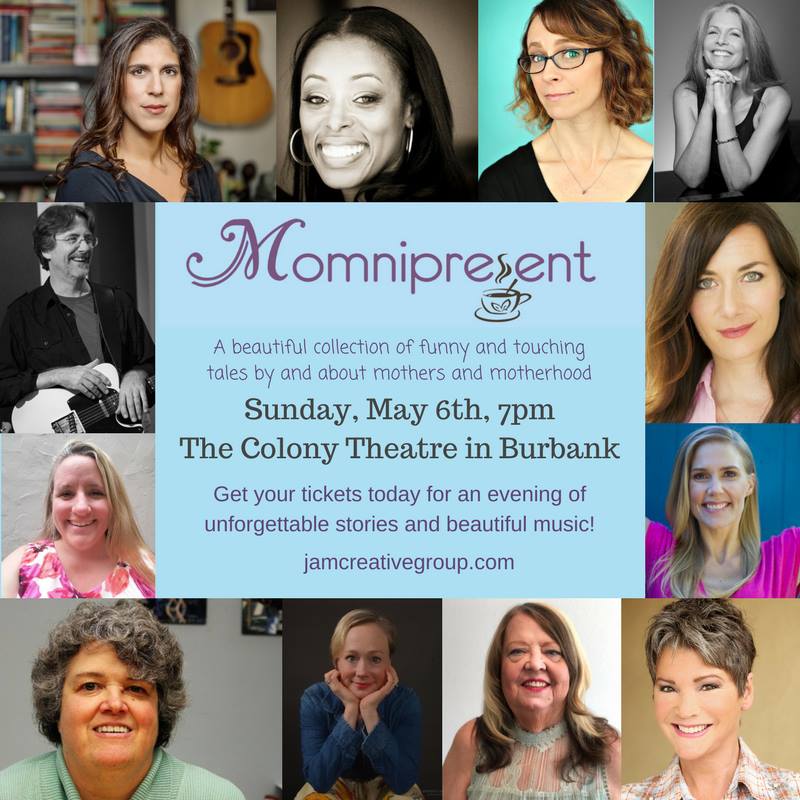|
"Delicious autumn! My very soul is wedded to it,
and if I were a bird I would fly about the earth seeking the successive autumns." - George Eliot Maybe September has always had a sacredness to it, between my childhood's sticky celebration of the Jewish holidays that practically tumble over each other from week to week in the fall, and the opening of the new academic year that still, now that I am adjunct faculty at Antioch University, rules my calendar. My psyche was, perhaps, already anticipating, when Darby and I kissed for the first time in September nine years ago, the deep journey of love and growth that has many times made me wonder at why we look upward to find sanctity when it is so often shining back at us, holy and pure, through the eyes of someone who loves us. No wonder Darby and I chose a date in September, six years after that kiss, and three years ago today, for our wedding. Darby, and I, and the kidlets - my stepdaughters who are two of my greatest teachers - stood in our backyard under a crystal chandelier hung from a branch of the mulberry, our dear friend Jeff officiated, and a small group of family and friends gathered around to witness our vows. I'm not sure that I have always believed that I deserved a love like Darby's, but I know that all my life I have hoped that I would be one of the lucky ones to receive such a gift. What's happening in the first photo below is this: Right about 5 pm, three years ago today, it was my turn to repeat the officiant as he read, line by line, the vows that Darby and I had written. It was a Saturday, and I'd taken two days off of work at the record label, and put aside for a few days my work for graduate school, where I was also the editor of the program's literary and art journal. I wasn't thinking of any of that, of course. I wasn't thinking about the cheese table, which friends had laden with flowers and fruit that afternoon. I wasn't thinking about the sitar, or the harmonium, or the friends who had walked us down the aisle from our bedroom to the tree with a sweet rendering of Buddy Holly's Everyday, or the caterer standing by with portobello mushrooms and lasagna, or the cake I'd made that was in the kitchen melting. I wasn't thinking about the malformed signature that I'd just affixed to our beautiful hand-drawn and hand-calligraphied ketubah. I wasn't, for the moment, concerned about family dynamics, or overhead airplanes. I was just here, standing beside my loving stepdaughters, with my hair in some unexpected 'do that the stylist had chosen that morning and wearing a friend's borrowed shoes, with more people in our backyard than I thought possible, about to officially wed the love of my life who looked terribly dashing in his fine linen three-piece suit. But an editor is an editor, I suppose. Just a moment before the photographer's shutter snapped, the officiant read a line that was ever-so-slightly not quite what we'd put on paper so many weeks before. Not consciously, I simply turned the phrase back around when I recited it to my almost-spouse. My mind was, I guess, trained to it. I'd been close-reading, proofreading, and editing for two years straight. The officiant looked back at his notes, laughed aloud about his error, and shared with everyone my editorial correction. The shift in attention, the jovial reaction of my almost-spouse, and the reference to my quotidian that felt so outside of the reverent moment caught me by complete surprise. I was so present, and this moment of laughter was authentically joyful. The shutter snapped. The photographer pinned the moment down forever. And we were married. The best thing I never decided to do was fall in love with Darby. It happened of its own accord - if you know Darby, you can surely understand how. Who knew we'd be even better married? Happy anniversary to us!
0 Comments
I could go crazy on a night like tonight When summer's beginning to give up her fight And every thought's a possibility And the voices are heard but nothing is seen Why do you spend this time with me Maybe an equal mystery - from "Mystery" by the Indigo Girls My letter writing this summer went to the birds because I've been tingling with creative endeavors so nascent and fragile that I haven't known how to write about them. They were born in the shed, the magic little house that went up between the back fence and the orange tree in April. Even in February, though, when I first started clearing out the space, I felt something simmering. Two voices vied in my head as I dug up the old garden and paid the contractor: Nothing you do will prove the worth of this cost. And, defiantly, quietly, truthfully: It's worth it to me. When the plywood room was finally erected with a glass door fitted with blinds and two windows that slide open for a breeze, I painted the walls, laid the flooring, and felt pulled.... pulled... I almost couldn't tell anyone, almost couldn't voice it... but....
Music and I were life-long lovers before a fracture came between us around eleven years ago. Prior to that, music had been my compass, my late nights and weekends, my journals and earphones, the miles on my car and, later, tour van. It had been the reason to get over stage fright, learn Photoshop, risk ridicule, debt, cold, poverty. But something fundamental wasn't working. We broke up. Fractured and songless, empty and quiet, instruments packed away, NPR news on the radio dial, I moved to Los Angeles. My newly empty calendar filled itself, mostly, with yoga. Through the Sutras, which examine identity, narrative, and suffering, I gained insights to the fault line between me and music, how we had fallen apart. Then I engaged with writing, not just journaling as I'd always done, but more literary, for others to read. The imagined audience further pushed me to untangle knotty issues with generous compassion. To discern the differences between perfection and wholeness. Slowly, slower than I would have ever thought possible, over more than a decade, the fissure sealed, the fracture healed. What they say about time? Sometimes they're right. And sometimes, also, we need a space. After these eleven years, stepping into my own room felt like the final knots on a Persian rug. I desired -- actually craved -- to play music again, actually play as I once had: because I love it, without expectation, without demands that it pay the rent. Simply for the enjoyment of it. Bringing breath into sound, into melody, into a story that is more than words, because it is married to music. On a retreat that I attended with him last summer, songwriter David Wilcox, advised trust. I am trying to listen to my new songs -- because yes! I have spent the summer in the shed writing new songs every week -- as if they are children. Let them be what they want to be. Here are two of the new ones from my Instagram channel. Maybe we need to sit on the floor and cry, eat a bowl of hopeless ice cream or cereal, escape into a movie or a run. Maybe we need to devolve into panic and fear, for an hour or a day. There may be one particular issue, or a hundred, that hits you like a wallop to the gut. Me too. And #metoo. In a very real way, at the most basic level, this administration's corruption threatens actual mortal lives. We feel hopeless and scared for ourselves, our children, our loved ones, our community, and, (for many of us who know that there but for fortune any issue that doesn't impact directly could) our fellow strangers. BUT -- This is what we get in exchange for growing up, for getting to choose what to put on our plates, when to go to bed, what to do with our extra cash, what to do with our time. We get to drive and work and purchase goods from companies of our choosing, set bedtimes for others, choose our own reading material, watch NC-17 movies, and vote once or a few times a year. WE ARE THE ADULTS. When robbers bang on the door, do we throw up our cynical adult hands, pessimistically rationalize that because the neighborhood is threatened we should simply stand by as thieves raid the house, loot the china cabinet, dig through the sock drawer for the Ajax container of stashed away cash? No, because WE ARE THE ADULTS HERE. So go on, feel sorry for yourself and for the muddled shitshow. Have a good cry on the living room floor. THEN: tuck the child-self in bed. We need to use our voices, our pens, our ballots, our signs, our letters, our town halls, our ACLU and EMILY's List, the local and national Democratic party (because like it or not, that's the party that's fighting against this gaslit-led erosion of human rights) -- and SHOW UP. If the purpose of voting for a third-party candidate or for Trump was to disrupt the establishment, well done. It worked. Maybe the establishment needed to be disrupted so that we would collectively grow up. Children -- my children, your children, our communities' children -- and others who are most vulnerable -- depend on US (as in We the People, not the USA). Maybe when the kids go to bed we have our own little pity parties and a stiff drink. But I hope you got a good night's sleep, because it's morning, and it's time to wake up, get over the cynicism and any other excuse to be lazy. If you're doing nothing but crying on FB and dousing activists' passion, you're part of the problem. Sign up for Resistbot, show up to a protest, take an hour to understand the ballot issues, and know that it takes all of us doing any little thing, a little every day, to get things back on track. Some Action Steps
Review excerpt: In my twenties, I spent summers in a Thoreau-like lakeside cabin in the woods, not far from Walden Pond. Even now, when it rains here in Los Angeles, and especially at night, even happily married as I am, I imagine I’m there in my cabin bed listening to the patter-ping of raindrops on Long Pond. I’d fall asleep to that music, or to the pulse of crickets and critters scampering along the mulchy path, and wake in the strange quiet before sunrise to mix bread dough for the retreaters who stayed in their own cabins down other paths. One summer there on the pond, a city friend accused me of having fallen in love. I had: with the pine-needled forest, the moonlight that draped like fabric to the sandy pond floor, the sunrise through the kitchen windows, the rain, and my cabin. Even so, every winter I returned to the city. And one summer, regretfully, inevitably, like Wendy grown up, I stopped returning to the woods. Ana Maria Spagna immigrated in the opposite direction, from the urban sprawl of her southern California childhood to the Pacific Northwest woods. Her descriptions of her adopted home in Stehekin conjure feelings of sparseness, far-off neighbors, evergreen-scented air, crackling autumn leaves, whispers of snow. Though Long Pond is on the other coast and I’ve never been to Washington, Spagna’s accounts of Stehekin in her newest book, Uplake: Restless Essays of Coming and Going, echo of my old home, the one I pine for when it rains or in the noise of daily living. However, if my memory of Long Pond has blurred into a sepia-toned former romance, Spagna knows her Stehekin like a time-tested marriage. Under her frank pen, the paradisaical forest is denied neither its beauty nor the choke-hold of fire season, racket of chainsaws, and slide of valley walls that are washing away in changing-climate floods. She fell in love with a place that is “pristine, spectacular, majestic, maybe even sublime,” but tied the knot with all its off-the-beaten-path pleasures and pains. Read the rest of the review here. In my early adulthood, with aspirations not for wealth but for creative fulfillment, I disciplined myself to live down to the bone. I nurtured thrifty tastes, saving my dimes for guitar strings and reeds. With my vegetarian diet, I shopped frugally, buying from the bulk bin, shopping in season and local, for a time splitting a $200 monthly rice and beans budget with a friend. I did not drink much alcohol, did not frequently dine out, did not indulge in fancy coffees or convenient sandwiches, did not buy frivolous clothes. Glad to finally enroll in what I fondly call Hogwarts School of Music, in my first semester at Berklee, instead of scrounging together $75 for a light-weight guitar gig bag, I drilled holes in my heavy hard-shell case and fashioned it with thick piano moving straps into something I could wear on my back. It was heavy, very heavy, particularly with my clarinet and laptop slung over my shoulders. I walked or took the T everywhere, and my back bent under the weight. In a recent newsletter to you, I wrote about raking up backyard leaves in a forgotten spot behind the garage, and my nascent vision of a cabin where I could practice my clarinet, try out song ideas, and work on essays and poems. It's been ages since I've had a room of my own, as Virginia Woolf wrote. I have long wished to sit in a windowed room and stare out the door at pale leaves as they unfurl into spring. I have wished for a room strong enough to withstand a thunder of ideas, because I have lately increasingly felt a rumble rolling through my heart, a heady mix of sound and emotion, art and media, questions and exploration. But I also wrote in that letter about fear of failure. I was worried about wasting money on something so specifically made by me for me. It felt a little arrogant: a playhouse for a grown woman who thinks she's got some talent or ideas worth the expenditure. What if I stepped into that arrogance, that audacity of hope (as Obama says), and nothing, in the end, comes? My fear might be rooted, in part, in an old Jewish superstition of the evil eye: If I do something so bold as build an artist studio just for myself, the heavens may train their unwanted attention on me, bringing tragedy to me or my loved ones. I should spit three times and hang a blue hamsa on the door. My frugality (always for my own desires, contrasted sharply, I hope, with my generosity for others) might also come from the valorization of parsimonious rationing in New England, where I lived for college and music graduate school, but whose culture I had admired since childhood. It suited the environmentalist in me: reduce, reuse, recycle. What throw-away materials might I re-fashion into use? How can I avoid purchasing newly manufactured goods, with their accompanying industrial waste and unneeded expense? But I bent beyond logic under the weight of that guitar case. I hadn't yet read Coleridge's The Rime of the Ancient Mariner, but I rued the albatross around my neck. The irony of it: that in my mid-twenties, finally glad to be at an incredible school and immersed in the study of music, I felt my instrument was a psychological curse I was tasked to bear. It took until my early thirties to examine the cliche of suffering for my art. Till then, I had accepted carte blance the stereotype of the starving artist. Looking back, I realize how easily I could have found $75 for a gig bag, saving my shoulders and neck a little of the physical pain that inevitably comes from the weight and repetitive motion of playing instruments. But I wanted so badly to be an artist, and from the stories I'd internalized, I thought suffering an essential part of a creative life. Fast forward to the past seven years, since Darby and the girls and I moved in together. It's a sweet house. Darby and I often say how glad we are that it isn't bigger. We want to stumble over each other, and engage with the teenagers even when they may prefer to sequester themselves in far off corners. The downside, though, is that I sometimes want to sequester myself away. As a musician, I need to make noise in order to get to the music. I am a lyrical writer, even in my prose, and tend to speak aloud every word as I write (even this, now). I've longed for a dedicated place where I can excavate my artist heart. A room of my own where I can throw ideas around, many ideas, because a good idea is not something that happens in isolation, but rather, comes out with dozens of bad-idea siblings. I've been yearning to throw spaghetti on the walls (I just love that phrase, don't you?) because something must eventually stick. Right? But what if nothing does? In this world of art as commerce, I have feared that the cost of building a little shed for myself won't find a return on the investment. And then I came across a passage in Elizabeth Gilbert's book Big Magic, where she writes, "Let me list for you some of the many ways in which you might be afraid to live a more creative life." This one struck hardest: "You’re afraid that someday you’ll look back on your creative endeavors as having been a giant waste of time, effort, and money." If a friend came to me with an idea, I would urge her to pursue it, to see where it will lead. In fact, after I wrote this post here, I heard from a number of you. Go for it! you said. The compounding encouragement was astounding. Your words amplified a desire deep inside me. So, this is all to tell you: I did it. It's a rule of cabins to have a name: Welcome to Seeds & Thunder, where on a daily basis I meditate, write, play music, and watch the pale leaves unfurl. If you're hungry to write, starting June 4 I'm teaching a 4-week online workshop that takes inspiration from recipes, menus, and what's in the cupboard. It doesn't matter where you live or when you logon. All that matters is that you have memories, senses, and a craving to put them to words. If you're hungry to write, sign up now - class starts June 4 and goes through July 2. Click: Feasting on Form to join in on our month-long feast of words, offered to the community through Inspiration2Publication from Antioch University. Limited space.
Just some music things I've been into:
Podcasts: I'm super excited about 3 music-inspired podcasts: Song Exploder dissects the writing/production process. Check out their episode list or skip right to St. Vincent dissecting "New York." If you like to get super nerdy over lyric/music prosody, check out Switched on Pop (try the episode on Kacey Musgraves's Butterflies). And though the solitary episode of Broken Record, with Rick Rubin and Malcolm Gladwell, makes me wonder if it was a publicity stunt, Eminem is a master of phonology, and I loved listening to him talk with DJ Double R, and Gladwell as they dig into Walk on Water. Bands: I'm With Her is a bluegrass super group. For years I've been a fan of Sara Watkins, Sarah Jarosz, and Aoife O'Donovan as individual players, so couldn't be happier to hear their lush, earthy harmonies all together. Check out their website to see their NPR Tiny Desk Concert. For more on the band, read this. Last year I sat in the audience, fretting that this annual Mothers Day event would be a pollyanna night of mothers cooing about how much they loved their baby from the minute they first met. Given my own journey of being a stepmother to my kids and estranged from my mother, I didn't think I could stomach the night. Instead, though, what I heard were stories of an adopted daughter's resentment at being taken from her culture, a divorced lesbian mother's relationship with her children, a daughter whose mother was crippled in an earthquake disaster. In short, the storytellers brought well-crafted, polished stories that were deep, touching, at times humorous, but most importantly, authentic. If you're in the Burbank area, I hope you'll come out and hear my story alongside these others -- stories united by the simple fact of parenting and/or having parents.
Pray don't talk to me about the weather, Mr. Worthing. Whenever people talk to me about the weather, I always feel quite certain that they mean something else. And that makes me quite nervous. - Oscar Wilde In the spring you can find our front door with your eyes closed. From the driveway, smell your way to the rose bush. A step or two later, pass between the narcissus blooms under the bird bath and the lavender, which has gone crazy since I planted it beneath the kitchen window box a few years ago. On the right, at the wall of blossoming jade, which started as a tiny clipping from the bush outside my former apartment, lift your foot for one, two, three steps. Here, open your eyes. Though you stand nose to twig at a wintery handmade wreath I found on Etsy a few months ago, there is no fragrance. I should probably find a new one for spring.
You'd better have a key ready, even if you hear voices clearly from within. Even if you knock, the door will not open without your effort. Even if you can report the very movie being watched on the other side. Even if you see through the window beside you the figure of a teenager as she passes from the living room through the dining room to the kitchen for a snack. You could try banging a hefty and frantic boom-boom, as she does every single time she comes home, but it's easier to just use your key. It's not as if you're in a rush: A whiff of orange blossoms floats over the roof from the backyard. Somewhere a finch sings. Inside, a barrage of new sensory input. The 13-year-old is in her chair three feet from the television, ten from the front door. You say "Hello!" in a cheery voice, imagining that perhaps she hadn't heard your car, your steps, the key. Her response is teenagery-dull. You pause for a moment to assess. The Matrix is on, 1, 2, or 3, you don't know (are there more?), but her head is bent over a sketch book. You attempt another greeting. "Whatcha watching?" as if you couldn't tell. "Whatcha drawing?" because sometimes she'll say. Maybe something radical like "How are you?" in another pleasant tone. The elements of simple communication that work so well with adults fall flat. "It's nice out this evening," you say, kicking off your shoes, knowing full well that she doesn't give a damn about the weather, the news, or connecting. I used to resent small talk. The low-hanging fruits of weather seemed only to pertain to the mindless, surface chatter of adults. It neither said anything nor did anything, I reasoned, and I suspect our 13-year-old feels the same, annoyed with the unsubstantial filler. There's an arrogance to her dullness. A judgement, I imagine, that raises her above petty niceties. Say something worthwhile or stop wasting my time. Like the writerly advice from Strunk & White: make every word count. Though she's more likely thinking, Just shut the fuck up. To her, I imagine small talk about the weather seems worth about as much as packing peanuts. Thirty gallons of the Styrofoam kind go for $9.27 at Walmart, so peanuts are basically worthless. Filler to brush away as you root around for the good stuff. Trash them or leave them to dissolve in the sink. They merely take up space and disappear. Like small talk. And yet, $9.27 is worth something, isn't it? People spend it gladly to cushion the good stuff. Olive oil. Porcelain. A vintage keyboard. Even our thirteen year old wouldn't think of shipping a delicate object unpadded to rattle around in a box, take every hit. I'm trying to think of something that's precious to her, an object to name here, but nothing comes to mind. She draws and writes, but appears to care little about anything else. Or this: she is precious; that gruff affect is her peanuts. The disdainful glances, dour responses. She's a newly-minted teenager, fresh out of childhood, en route to adulthood, jostled around at every bend. Her mood is her $9.27 of bubblewrap. It's the hard shell of chrysalid, because maybe she's gone completely to goo inside and needs a stern exterior to ensure her safety. It's scaffolding, because didn't you see the signs? Construction Zone! No trespassers! I get it as best as a forty-something-woman/former-girl with faulty memory can get it, but it's been a minute or two since I was thirteen. Thank the stars. Some day, when she's less gooey on the inside, I wonder if she'll see how stark the chasms can be between two individuals. How we've all been thirteen, all've been goo, but no two goos are the same, and how do we start from that? Humans might be a social species, but how on earth do two people who have been spinning in their own separate orbits all day long possibly begin to connect? Though I used to resent small talk, it's really kind of beautiful, isn't it? Those slender cords of niceties, weather. "Look at that rain": a rope thrown from one to another. It's a hefty job that a beautiful day commands. Wind, clouds, the jasmine in the air: Delicate as they are, their forces are greater than us. I don't know how your day is, nor do you know mine. So let's talk about the weather, enter carefully into each other's orbits, and look up at our shared sky. You drop your bags, prick your ears for the others. Music from the studio: Darby is working on a tune. A scrape on the stove: the 17-year-old is cooking. Meaty scents. It's hard to tell whose dinner, with vegetarian sausages lately so close to the real thing. You make your rounds greeting them, then duck into the bedroom for a quick costume change. The backdoor is open to the early evening. In an old Dr. Pepper bottle on the dresser, Darby's put a twig of orange blossoms, white blooms, green leaves. I am a feminist regardless of changes over the years in my hair style, lovers, and underclothes. In my echo chamber of a world, it wasn't till I was in Florida this past week that I quite realized there still lingers in left-of-center supporters negative connotations of the word "feminist." Some of the most ardent supporters of women's rights -- or people who, in any case, truly believe they are -- balk at the word. They still fear bra-burning and head-shaving and lesbians. What's so scary about those things? What do those personal choices have to do with the word "feminist"?
In the heat of discussion, it's hard to parse this out in a way that can really be heard. Studies, after all, have shown that it is human nature to cling to what we believe, despite all evidence to the contrary. But can we discuss this? Like all words, "feminist" stands in as a symbol of a concept. Can we untangle the misogynist spin on it? The political forces that have been invested in painting it as something to balk at? Can we talk about how the very idea of feminism is not a flipping of patriarchy -- not merely a turning over so that women are on top and men are on bottom? Not a stiletto stamping on the face of a man. Not an army of man-haters coming to tear apart everything known and loved in the world. Feminism is not a reversal of patriarchy. It is a complete paradigm shift. Read this as "intersectional feminism." Acknowledge that the participants in this discussion has become more inclusive over the decades. Feminism is the concept of equality. It is the radical concept that re-envisions an historically biased hierarchy that has benefited a single demographic over all others. Feminism is the idea of a level playing field where all people should be valued for what they bring to the table. Where differences are appreciated and considered a benefit, not a detriment, to the whole culture. Can we discuss this with respect, self-examination, and open minds? |
Archives
May 2019
Categories
All
|
